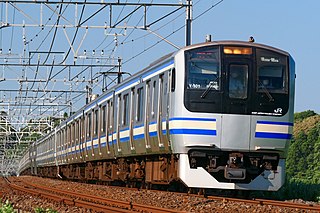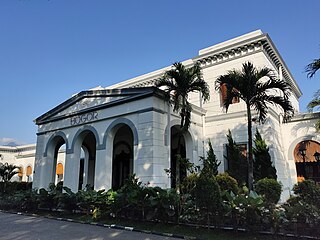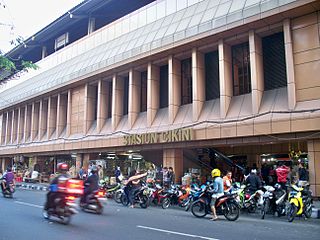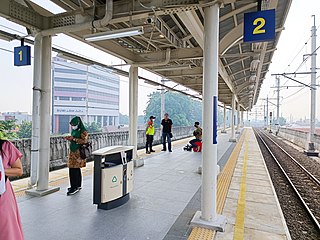
The majority of Indonesia's railways are on Java, used for both passenger and freight transport. There are three noncontinuous railway networks in Sumatra while two new networks are being developed in Kalimantan and Sulawesi. Indonesia has finalized its plan for a national railway network recently. According to the plan, 3,200 km of train tracks that will criss-cross the islands of Sumatra, Java, Kalimantan, and Sulawesi, it has been touted as the most extensive railway project in Indonesia since its independence from the Dutch in 1945. Indonesia targets to extend the national railway network to 10,524 kilometres by 2030. As of September 2022, the network spans 7,032 km.

The 203 series (203系) is an electric multiple unit (EMU) train type operated in Japan between 1982 and 2011 by Japanese National Railways (JNR) and later by East Japan Railway Company, and currently operated by KAI Commuter and Philippine National Railways.

The E217 series (E217系) is a suburban electric multiple unit (EMU) train type operated by East Japan Railway Company in the Kantō region of Japan since 1994.

The TRTA/Tokyo Metro 05 series is an electric multiple unit (EMU) train type operated on the Tokyo Metro Tozai Line and Tokyo Metro Chiyoda Line Ayase Branch in Japan by the subway operator Tokyo Metro. Some sets have also been shipped to Indonesia, where they operate on the KRL Commuterline system in Jakarta.

KRL Commuterline, commonly known as Greater Jakarta Commuter rail, or KRL Commuter Line Jabodetabek is a commuter rail system for Greater Jakarta in Indonesia. It was previously known as KRL Jabodetabek. It is operated by KAI Commuter (KAIC/KCI), a subsidiary of the Indonesian national railway company PT Kereta Api Indonesia (KAI). The rail system uses rolling stock of rapid transit standard and operates at high frequency with a minimum headway. In 2019, the average number of Commuterline users per day reaches average of 1.04 million, with the record of the highest number of users served in a day being 1,154,080.
PT Industri Kereta Api (Persero), abbreviated as INKA, is an Indonesian state owned rolling stock manufacturer.

Bogor Station (BOO), formerly Buitenzorg Station, is a railway station located in the city of Bogor, West Java. This station serves as the terminus for the Red Line service of KRL Commuterline. The station has five island platforms and two side platforms. The station is located +246 meter above sea level.

Cikini Station is a railway station located on Jl. Cikini Raya, Cikini, Menteng, Jakarta. This station is only served by KRL Commuterline commuter trains from Jakarta Kota to Depok and Bogor.

Pasar Minggu Station (PSM) is a railway station in Pasar Minggu, Pasar Minggu, South Jakarta. The station, which is located at an altitude of +36 meters, is included in the Operation Area I Jakarta and only serves the KRL Commuterline route.

The Bogor Line, officially the Bogor Commuter Line, is a commuter rail line in Indonesia, operated by PT Kereta Commuter Indonesia (KCI). The line connects Jakarta Kota station in West Jakarta and Bogor station in Bogor, West Java. On maps and diagrams, the line is shown using the color "red". The line is the busiest in the KA Commuter system.

The Rangkasbitung Line, officially the Rangkasbitung Commuter Line, is a commuter rail line in Indonesia, operated by PT Kereta Commuter Indonesia (KCI). The line connects Tanah Abang station in Central Jakarta and Rangkasbitung station in Lebak Regency, Banten. On maps and diagrams, the line is shown using the color "green". Tanah Abang–Rangkasbitung line is the longest and fourth busiest line in the KRL Commuterline system.

KA Commuter line Jatinegara–Bogor or the Jakarta loop line was a commuter rail line in Indonesia, operated by PT Kereta Commuter Indonesia (KCI). The line connected Jatinegara station in East Jakarta and Bogor station in Bogor, West Java. On maps and diagrams, the line was shown using the colour "yellow". The Jatinegara–Bogor line was the second busiest line in the KA Commuter system. Covering the distance of 69.35 kilometres, it was the longest KA Commuter line, combining the loop-line on Jatinegara–Kampung Bandan–Tanah Abang–Manggarai with Manggarai–Depok–Bogor lines.

Juanda Station is a railway station located in Kebon Kelapa, Gambir, Central Jakarta, Jakarta, Indonesia. Since Gambir station stopped serving Commuterline trains, Juanda, along, with Gondangdia station, has become the alternative for passengers going to Merdeka Square and the surrounding areas. It is also located near the Istiqlal Mosque.

Soekarno–Hatta Airport Commuter Line or simply Soekarno–Hatta Line is an airport rail link service in Greater Jakarta, Indonesia. This airport rail link was built to cut travel time from the Jakarta city center to the airport, as roads connecting the Soekarno–Hatta International Airport (SHIA) and Jakarta city center are frequently affected by traffic congestion.

BNI City station is a station for the Soekarno-Hatta Airport Rail Link and KAI Commuter service. Bank Negara Indonesia (BNI) holds the naming rights for the station, which was known as Sudirman Baru station during construction period. The station is located in Central Jakarta, on the north bank of West Flood Canal, about a hundred meters from Sudirman Commuter Rail station. The station is part of Dukuh Atas TOD.

Prambanan Express Commuter Line or simply Prambanan Express, commonly abbreviated as Pramex and Prameks, is a commuter rail service that operates between Yogyakarta, Special Region of Yogyakarta and Kutoarjo, Purworejo Regency, Central Java in Indonesia. The service, which first operated in 1994, covers a distance of about 64 kilometers and operates using diesel multiple unit trains. It was previously serving Yogyakarta–Solo for 26 years before it was electrified in 2021.

The EA203 series is an Electric Multiple Unit produced by Industri Kereta Api, in collaboration with Bombardier which will be used as Soekarno–Hatta Airport Rail Link express services from Manggarai Station in Jakarta to Soekarno–Hatta International Airport at Tangerang, Banten. EA203 series was purchased by PT Railink, a joint venture between PT Kereta Api Indonesia and PT Angkasa Pura II which is the operator of the airport train in Indonesia, totaling 60 units divided into 10 series with 6 car formations. EA203 series was sent from its factory in Madiun to Jakarta in stages starting in August 2017.

KAI Commuter Yogyakarta Line, officially the Yogyakarta Commuter Line, is a commuter rail system in Indonesia serving Greater Yogyakarta in Special Region of Yogyakarta and Greater Surakarta (Solo) in Central Java. Operated by KAI Commuter, subsidiary of the national railway company Kereta Api Indonesia (KAI), it is the first electric-powered commuter rail system in Indonesia outside of Greater Jakarta's KRL Commuterline. The single-line system replaced Yogyakarta-Solo section of diesel-powered commuter rail Prambanan Ekspres (Prameks), also operated by KAI Commuter, on 10 February 2021.

The Matraman Station (MTR) is the KRL Commuterline train station located on the border between Kebon Manggis, Matraman and Kampung Melayu, Jatinegara, East Jakarta, Indonesia. This station is adjacent to the Gunung Antang localization area and was built as the part of the Manggarai–Cikarang doubled-double track project.



















